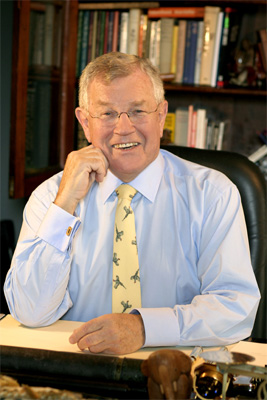Professor Terry Bolin on Bowel Cancer

Bowel Cancer
Tragic new government figures have shown that Australians do not understand the risk of the second-biggest cancer killer, Bowel Cancer.
The report prepared by the Australian Institute of Health and Welfare (AIHW) revealed that only 36.6% of those people in the target age group for bowel cancer had participated in the screening program. 686,000 50-65 years olds were invited to participate in the National Bowel Cancer Screening Program.
The Gut Foundation is unhappy with Australia's poor participation in the National Bowel Cancer Screening Program; research also showed a disappointingly low follow-up rate for positive results.
Interview with Professor Terry Bolin
Professor Terry Bolin is the President of the Gut Foundation.
What did you find most surprising about this study?
Terry Bolin: Well the fact that it is the commonest cancer in non-smokers and almost as many women die from bowel cancer as breast cancer. But bowel cancer is preventable where as breast cancer is breast cancer from day one. Bowel cancer affects almost as many women as men and 12 people die unnecessarily every day from bowel cancer. We think there should be an educational campaign to tell people more about their risk, there is a national bowel cancer screening program already but that has limitations because it only targets people aged 50, 55 and 65 years of age and ignores those not of that age.
There are two ways of testing, because cancers and polyps bleed a little bit most of the time, not enough for you to see, but enough for it to be found by a chemical test, that is what the government test is, that is done every two years. That may reduce the mortality of cancer by about 15%-20%. The other way of doing it is by doing a colonoscopy, which is an examination of the whole colon and you do that every 5-10 years. So, it is a bit more invasive in the beginning but the outcome is much better for you. It reduces mortality by 70%. In addition to that, it can prevent cancer because when you do the colonoscopy, you can find polyps that are not bleeding and remove them; this removes the risk of cancer developing. You have two choices, those you should discuss with your doctor.
Why do you think only 36.6% of those invited, chose to participate in the screening?
Terry Bolin: I think it is partly the invitation they get, it an official letter from the government including a little test kit. A lot of people are put off by that, they would like something a bit more friendlily, as it is written by a government department. It also doesn't really explain their real risk. Even worse than less than 40% taking up the test, when the test is positive, which means you may have cancer or a polyp, only two thirds have gone on to have a colonoscopy. The other third are sitting on a time bomb; they have received a positive test and have really done nothing about it.
How can we ensure those in the correct age group follow the appropriate measures to ensure early detection of bowel cancer?
Terry Bolin: The message is that everyone is at risk and the risk is dependent on your age. So the risk begins at the age of 40 and then it doubles every ten years after the age of 50. When any one goes to talk with their general practitioner about breast cancer, blood pressure, cholesterol, diabetes or being overweight, that is the opportunity to throw in a question about bowel cancer. If the doctor says "you don't need it" I think that is not the right advice. Explain that you have heard there are two choices; I've heard you can have an annual test looking for blood or I can have a colonoscopy every 5-10 years. I think the colonoscopy is the better way to go. Choose something, don't choose to do nothing.
MORE
- Chiropractic Myths & Truths
- Gerard Fogarty Arthritis and Knee Replacement...
- Kym Ellery The ELLERY Eyewear Collection Interview
- Dr Ross Walker The Real Modern Killers Interview
- Shelly Horton Hay Fever Help Interview
- Sebastian VanVeenendaal Royal Rehab's Beach...
- Abigail Koch Family Private Health Insurance...
- Monique Cashion Organic Awareness Month Interview
- Dr Bill Harris Omega-3s Interview
- The Top Ten Health Myths Busted
- Professor Bolin IBD Management a Life-Long...
- Anthia Koullouros Best Cold and Flu Defence...
- Leprosy in NSW
- Julie-Anne Mitchell Go Red for Women Healthy...
- Insight into Chronic Disease Hospitalisations...
- Jeff Chan Mobile Phone Allergies Interview
- How to Conquer Bad Winter Health Habits
- Bad Cholesterol Behind Cancer Spreading In Body
- New Screening Test Recommended To Help Prevent...
- Support For The Rural Nurse Workforce A...
- Kathy Nielsen Ovarian Cancer Australia National...



